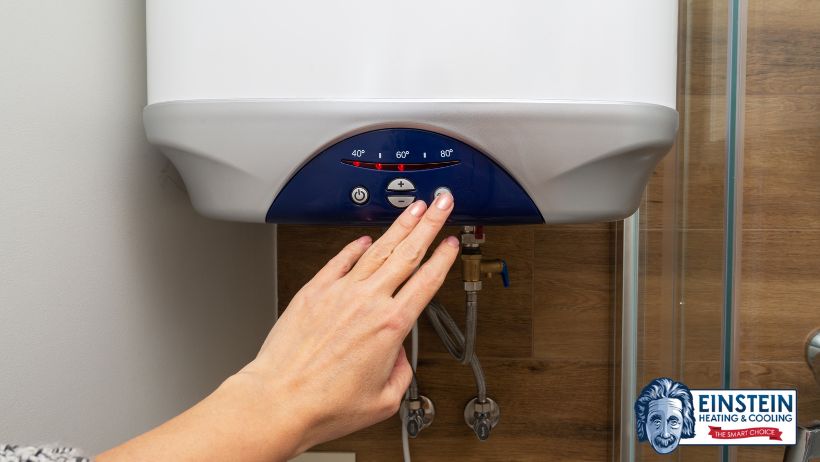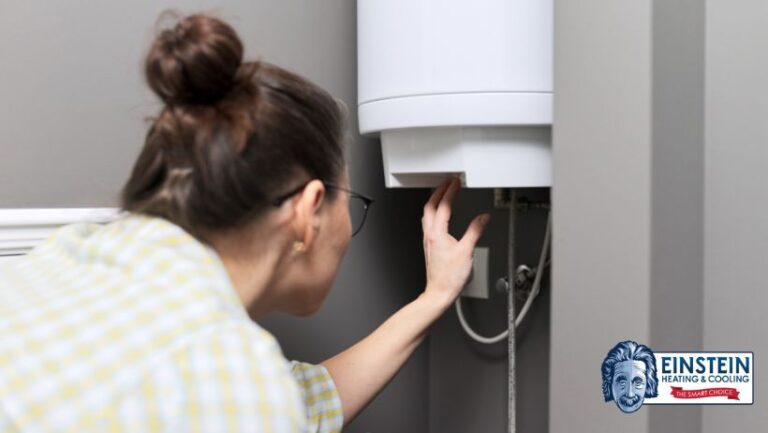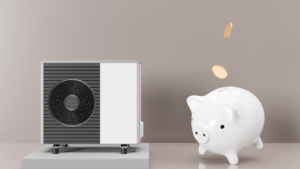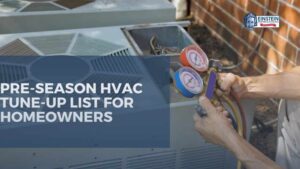When it comes to heating your home’s water supply, the choice between traditional tank water heaters and tankless water heaters can significantly impact your comfort, energy efficiency, and utility bills. In this article, we will explore the pros and cons of using a tankless water heater in your Bend home, focusing on its relevance to HVAC systems and energy efficiency.
1. Energy Efficiency
Tankless water heaters, also known as on-demand water heaters, excel in energy efficiency, a key factor in optimizing your HVAC system’s performance. The fundamental principle behind their efficiency lies in their ability to heat water only when it is needed, in contrast to traditional water heaters that store and maintain a constant supply of hot water. This “on-demand” heating method results in significant energy savings, making it a cost-effective choice for homeowners.
The energy efficiency of tankless water heaters can be primarily attributed to the absence of standby heat loss. Traditional tank water heaters continuously heat a large volume of water, which leads to heat loss as the hot water sits in the tank, waiting to be used. This continuous heating is not only wasteful in terms of energy consumption but also puts unnecessary strain on your HVAC system. With tankless systems, the water is heated only when you turn on a hot water tap or activate an appliance that requires hot water. As a result, there is no standby heat loss, minimizing the energy required to maintain hot water temperature. This energy-efficient approach not only benefits your utility bills but also contributes to the overall efficiency of your HVAC system.
Tankless water heaters are equipped with highly efficient heat exchangers that transfer heat directly to the water. This design ensures minimal heat loss during the heating process, and as a result, the water is heated to your desired temperature instantly. This feature provides you with a constant and reliable supply of hot water while reducing the workload on your HVAC system, allowing it to operate more efficiently.
In the context of HVAC systems, the energy efficiency of tankless water heaters is particularly significant. In regions like Bend, Oregon, where harsh winters are common, the demand for hot water increases, especially for radiant heating systems. An efficient hot water supply is crucial for these systems to function optimally and maintain a comfortable indoor environment. Tankless water heaters ensure that your HVAC system operates optimally even during the harshest weather conditions, contributing to your overall home comfort.
2. Endless Hot Water Supply
One of the most significant advantages of tankless water heaters is their ability to provide a constant and uninterrupted supply of hot water. This feature is highly advantageous for households with high hot water demands, such as large families or homes with multiple bathrooms and appliances requiring hot water simultaneously. With a tankless system, you won’t need to schedule showers or appliance use at specific times to avoid running out of hot water, eliminating the inconvenience of cold water interruptions.
The endless supply of hot water is especially valuable in regions like Bend, Oregon, where temperatures can drop significantly during the winter months. In such conditions, hot water is not just a matter of personal comfort but also a necessity for your HVAC system. An efficient hot water supply is crucial for radiant heating systems, which rely on hot water to generate warmth for your home. Tankless water heaters play a vital role in ensuring that your HVAC system functions optimally even during the most extreme weather conditions, contributing to your overall home comfort.
The ability to provide a continuous flow of hot water is not only convenient for everyday living but also essential for maintaining the efficiency of your HVAC system. In a cold climate like Bend, keeping your home warm and comfortable is of paramount importance. A tankless water heater guarantees that your HVAC system has access to the hot water it needs, ensuring that your home remains cozy even in the most frigid temperatures.
3. Space-Saving Design
Tankless water heaters are designed with a space-saving approach in mind. They are typically compact and can be wall-mounted, making them ideal for homes with limited space. This design is a significant benefit, especially in situations where space constraints are a concern.
Traditional tank water heaters, in contrast, tend to be bulkier and require a substantial amount of floor space. This can be a significant drawback, particularly in homes with limited square footage. In such cases, the compact and wall-mounted design of tankless water heaters is a real boon, as it frees up valuable space that can be used for other purposes or even to accommodate additional HVAC components or energy-efficient upgrades.
In Bend, Oregon, where winters can be harsh and HVAC systems need to operate efficiently to combat the cold, the space-saving design of tankless water heaters can be a real advantage. It allows homeowners to optimize their HVAC setups and ensures that there is sufficient space for necessary components. This design not only contributes to the efficient operation of your HVAC system but also enhances your overall living conditions.
The space-saving design of tankless water heaters is a valuable asset when it comes to optimizing your home’s HVAC system. It not only ensures that your home remains comfortable during the chilly winters but also allows you to make the most of your available space. This can be particularly significant in homes where space is limited, and every square foot counts. Tankless water heaters offer the flexibility to allocate your space for other HVAC components or energy-efficient upgrades, further enhancing the overall efficiency of your home’s heating and cooling systems.
- Traditional tank water heaters have the potential to develop leaks, which can lead to significant water damage in your home. These leaks often occur due to the constant presence of water in the tank and the aging of the tank’s components. When a tank water heater leaks, it can result in expensive repairs and potentially disrupt your HVAC system’s functioning.In contrast, tankless water heaters have a reduced risk of leaks since they do not store water. The water is heated on demand, so there is no large tank that can fail. While leaks are still possible with tankless systems, they are less frequent and usually result from issues such as faulty installation or deteriorating components, which can be addressed with regular maintenance. By reducing the risk of water damage, tankless water heaters contribute to the overall well-being of your home and the efficient operation of your HVAC system.
Cons of Using a Tankless Water Heater
- Higher Initial Cost
- One of the primary drawbacks of tankless water heaters is their higher upfront cost compared to traditional tank water heaters. The initial investment for a tankless system is greater because of several factors, including the complexity of the unit, the need for professional installation, and any required modifications to accommodate the system.Tankless water heaters are more technologically advanced than their tank counterparts, with features like efficient heat exchangers and precise controls. These components contribute to their energy efficiency and longer lifespan but also drive up the cost of production. Additionally, installing a tankless water heater usually involves modifications to your home’s plumbing and electrical systems, adding to the upfront expenses.While the higher initial cost may deter some homeowners, it’s essential to consider the long-term benefits of energy savings and increased HVAC system efficiency. Tankless water heaters are an investment that pays off over time, even though they require a more substantial upfront commitment.
- Tankless water heaters have a specific flow rate that determines how much hot water they can produce per minute. If your household has high hot water demands, such as simultaneous showers, dishwashing, and appliance usage, you may require multiple tankless units or a larger system to meet these demands effectively. Ensuring an adequate flow rate is crucial to maintaining your overall home comfort and the efficiency of your HVAC system.The flow rate limitation is primarily due to the capacity of the heat exchanger and the unit’s heating power. While tankless water heaters are efficient, they have their limitations in terms of how much hot water they can deliver simultaneously. It’s crucial to size your tankless system correctly to match your specific hot water needs. An undersized system may lead to insufficient hot water supply, negatively impacting your comfort and the efficiency of your HVAC system.

1. Higher Initial Cost
One of the primary drawbacks of tankless water heaters is their higher upfront cost, which should be weighed against long-term benefits, including HVAC system efficiency. The complexity of the unit, professional installation, and potential modifications to your home’s systems can increase the initial investment. While the upfront cost is substantial, it pays off through energy savings and improved HVAC system performance.
2. Limited Flow Rate
Tankless water heaters, despite their many advantages, do have limitations when it comes to the flow rate. The flow rate determines how much hot water the unit can produce per minute, which can impact your overall home comfort and the efficiency of your HVAC system.
Properly sizing a tankless water heater is crucial to ensure it can meet your hot water demands. If you have high hot water requirements, such as simultaneous showers, running the dishwasher, and using multiple appliances, you may need a larger unit or even multiple tankless units to meet these demands effectively. Undersizing your tankless system can lead to an insufficient hot water supply, which not only affects your daily comfort but can also have repercussions for your HVAC system.
The flow rate limitation is primarily due to the capacity of the heat exchanger and the unit’s heating power. While tankless water heaters are efficient, they do have their limits in terms of how much hot water they can deliver simultaneously. Properly sizing your tankless system ensures that it can provide the hot water you need for your daily activities without causing discomfort or disruptions. In the context of HVAC systems, this becomes even more critical in regions with harsh winters like Bend, Oregon, where radiant heating systems rely on hot water for efficient operation. Ensuring a sufficient flow rate is essential to maintain your home’s warmth and comfort during cold weather.
3. Cold Weather Performance
In regions with cold climates, like Bend, Oregon, tankless water heaters face a unique challenge: the low incoming water temperature during the winter months. This frigid water temperature can pose a significant hurdle to tankless water heaters, as they may struggle to achieve the desired hot water temperature efficiently.
To address this issue, homeowners in cold climates may need to consider installing a larger or more powerful tankless unit or using tempering valves to increase the water temperature. However, these solutions can come at a cost. For instance, a larger unit may consume more energy, potentially affecting your energy bills and the overall efficiency of your HVAC system.
The cold weather performance of tankless water heaters is crucial for homeowners in regions with harsh winters. In Bend, where radiant heating systems are prevalent, the performance of your tankless water heater can significantly impact the efficiency of your HVAC system. Adequate hot water supply is vital for these systems to function optimally and provide comfortable indoor temperatures during the winter. Ensuring that your tankless system can cope with the cold temperatures is essential to maintain your comfort and the efficiency of your HVAC system.
4. Maintenance and Repairs
While tankless water heaters are known for their longevity, they are not entirely maintenance-free. Over time, mineral deposits and scale can build up inside the unit, affecting its performance. Regular maintenance is necessary to keep the system running efficiently, which may involve flushing the unit to remove these deposits.
Maintenance and repairs for tankless water heaters can be more complex and potentially costly than those for traditional tank systems. The components of tankless systems are intricate and require specialized knowledge for servicing. Additionally, the complexity of maintenance and repairs can lead to longer service times, potentially leaving you without hot water temporarily.
Proper maintenance is essential for ensuring the longevity and efficiency of your tankless system. Neglecting maintenance can result in reduced performance and, in some cases, the need for more extensive and costly repairs. Despite the complexity of maintenance for tankless water heaters, it is a crucial part of maintaining the overall efficiency and reliability of your HVAC system.
5. Electrical and Gas Requirements
Tankless water heaters require a reliable source of electricity or gas to operate. If your home lacks the necessary infrastructure, the installation of a tankless system can be more challenging and costly. This requirement may necessitate electrical or gas line upgrades, further increasing the initial investment and affecting the overall cost of your HVAC system upgrade.
The electrical and gas requirements of tankless water heaters depend on the unit’s size and heating capacity. Smaller units may operate on standard electrical circuits, but larger models may require dedicated circuits or upgrades to your electrical panel. The gas requirements are also determined by the unit’s size, with more substantial units needing larger gas lines and potentially a larger gas meter.
Addressing these requirements is essential to maximize the efficiency of your HVAC system with a tankless water heater. The increased efficiency and energy savings offered by tankless systems can offset the initial expenses in the long run, making it a valuable investment for your home. However, ensuring that your home’s infrastructure can support a tankless water heater is a critical step in reaping these benefits.
Why Choose Einstein Heating and Cooling for Your Tankless Water Heater Needs
When it comes to addressing the hot water needs of your Bend home and ensuring the optimal functioning of your HVAC system, choosing Einstein Heating and Cooling is a wise decision. With a deep understanding of the 5 pros and cons of using a tankless water heater for your Bend residence, our expert team is well-equipped to guide you through the selection, installation, and maintenance of the perfect tankless water heater for your specific requirements. We understand the significance of energy efficiency, endless hot water supply, space-saving design, longevity, and minimizing the risk of water damage in your HVAC system. Einstein Heating and Cooling not only provides top-tier products but also offers professional services to ensure that your tankless water heater operates at its best. With our knowledge and commitment to excellence, we help you make the right choice for your home, maximizing both your comfort and energy savings while keeping in mind the unique demands of the Bend climate.








